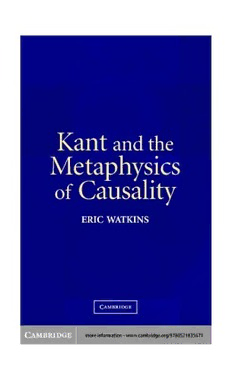
Kant and the metaphysics of causality PDF
Preview Kant and the metaphysics of causality
KantandtheMetaphysicsofCausality ThisisabookaboutKant’sviewsoncausalityasunderstoodintheir properhistoricalcontext.Specifically,EricWatkinsarguesthatagrasp of Leibnizian and anti-Leibnizian thought in eighteenth-century Germany helps one to see how the Critical Kant argued for causal principlesthathavebothmetaphysicalandepistemologicalelements. Onthisreading,Kant’smodelofcausalityconsistsnotofevents,but ratherofsubstancesendowedwithcausalpowersthatareexercised accordingtotheirnaturesandcircumstances. ThisinnovativeconceptionofKant’sviewofcausalitycastsalight on Kant’s philosophical beliefs in general, such as his account of temporality, his explanation of the reconciliation of freedom and determinism,andhisresponsetotheskepticalargumentsofHume. EricWatkinsisAssociateProfessorofPhilosophyattheUniversityof California,SanDiego. ForTeresa,Christa,andNicholas Kant and the Metaphysics of Causality ERIC WATKINS UniversityofCalifornia,SanDiego Cambridge, New York, Melbourne, Madrid, Cape Town, Singapore, São Paulo Cambridge University Press The Edinburgh Building, Cambridge , UK Published in the United States of America by Cambridge University Press, New York www.cambridge.org Information on this title: www.cambridge.org/9780521835671 © Eric Watkins 2005 This book is in copyright. Subject to statutory exception and to the provision of relevant collective licensing agreements, no reproduction of any part may take place without the written permission of Cambridge University Press. First published in print format - ---- eBook (NetLibrary) - --- eBook (NetLibrary) - ---- hardback - --- hardback - ---- paperback - --- paperback Cambridge University Press has no responsibility for the persistence or accuracy of s for external or third-party internet websites referred to in this book, and does not guarantee that any content on such websites is, or will remain, accurate or appropriate. Contents Acknowledgments page vii ANoteonCitationsandTranslations xi Introduction 1 part i: causality in context 1 Pre-establishedHarmonyversusPhysicalInflux 23 Introduction 23 LeibnizandtheManyFacesofPre-established Harmony 24 ChristianWolffandPre-establishedHarmonyin Eighteenth-CenturyGermany 38 Knutzen’sLeibnizianArgumentsforPhysicalInflux 50 BaumgartenandMeier:ANewCaseforPre-established Harmony 73 CrusiusandFundamentalPowers 81 Conclusion 93 2 Kant’sPre-CriticalTheoryofCausality 101 Introduction 101 Kant’sConceptofForceintheTrueEstimationand PhysicalMonadology 104 TheNovadilucidatioandthePrincipleofSuccession 112 TheNovadilucidatioandthePrincipleofCoexistence 140 Kant’sPre-CriticalReactiontoHume 160 NewDevelopmentsintheInauguralDissertation 170 Conclusion 177 v vi Contents part ii: causality in the critical period 3 Kant’sSecondandThirdAnalogiesofExperience 185 Introduction 185 TheContextoftheSecondandThirdAnalogies 185 TheArgumentoftheSecondAnalogy 203 TheArgumentoftheThirdAnalogy 217 Conclusion 229 4 Kant’sModelofCausality 230 Introduction 230 EventsandEvent-BasedModelsofCausality 232 Grounds,CausalPowers,andDeterminations 243 MakingSenseofActivity,orthe“CausalityoftheCause” 265 ImplicationsfortheSecondandThirdAnalogiesandfor the“CriticalTurn” 282 Conclusion 296 part iii: causality and consequences 5 TheMetaphysicsofFreedom 301 Introduction 301 TheThirdAntinomy 304 AspectsofTranscendentalIdealism 317 FreedomandCausality 343 Conclusion 360 6 Kant’sReplytoHume:HistoricalandContemporary Considerations 362 Introduction 362 TheHistoricalQuestionofKant’sReplytoHume 363 ContemporaryConsiderations 389 Conclusion 421 Conclusion 423 Bibliography 431 Index 441 Acknowledgments Igratefullyacknowledgethehelpandsupportofnumerouspeopleand institutions while I was working on this book. In some sense, I have been thinking about the issues discussed in this book ever since I first readKant’sKritikderreinenVernunftfrombeginningtoendinaseriesof seminars that Lorenz Kru¨ger taught over several semesters at the Freie Universita¨t Berlin starting in 1984. Kru¨ger’s interest in understanding Kant’s theoretical philosophy both in its own terms and in light of the relevantscientificcontexthasservedasausefulLeitfadenguidingmyown interpretiveapproacheversince.Subsequently,Ihavebenefitedfromin- teractions with an increasing number of German Kant scholars – with Reinhardt Brandt, Wolfgang Carl, Martin Carrier, Konrad Cramer, Heiner Klemme, Manfred Kuehn, Wolfgang Lefevre, Georg Mohr, WernerStark,ThomasSturm,andDieterSturmadeservingspecialmen- tion.WhiletheGermanandAmericanphilosophicaltraditionshave,at times,useddifferentmethodstopursuedivergentpathsofinquiry,Ihave profited tremendously from what is distinctive in the German tradition andhaveattempted,inasustainedwayovertheyears,toseehowcombin- ingitsuniqueinsightswithlinesofinvestigationprominentonthisside oftheAtlanticcanleadtoabroaderandmorebalancedunderstanding ofwhatKantwastryingtosay. Uncountably – or at least unmentionably – many members of the Americanphilosophicalcommunityhavebeenimportanttomeinboth direct and indirect ways in writing this book as well. While any list of reasonablelengthwouldbeegregiouslyincomplete,Inonethelesswant to acknowledge helpful discussions over many years and in many dif- ferent contexts with Henry Allison, Richard Aquila, Fred Beiser, Eckart vii viii Acknowledgments Fo¨rster, Michael Friedman, Daniel Garber, Hannah Ginsborg, Michelle Grier,PaulGuyer,PatriciaKitcher,PaulineKleingeld,RudolfMakkreel, SteveNaragon,andAllenWood.Ofcourse,pastcolleaguesandformer students at Virginia Tech and Yale have had an important influence on meandmywork–inparticular,RobertAdams,RogerAriew,DickBurian, Andrew Chignell, John Christman, Patrick Croskery, Michael Della Rocca,MarkFisher,BillFitzPatrick,DesmondHogan,SukjaeLee,L.A. Paul,JosephPitt,andPeterThielke.Anumberofphilosophicalfriends havebeenbothstimulatingandenjoyableinterlocutorsformanyyears,es- peciallyJanCover,PatKain,PaulLodge,TrentonMerricks,MikeMurray, Fred Rauscher, Jim Schmidt, Dave Vessey, Thomas Williams, and Falk Wunderlich. My current colleagues at the University of California, San Diego,haveinfluencedmythinkingaboutKantaswell.Ihavehaddiscus- sionswitheveryoneofthemaboutvariousideascontainedinthebook, and many have been so generous as to read and provide comments on several chapters – Nancy Cartwright on Chapter 4; Craig Callender on sectionsofChapter6;DanaNelkinonChapter5andotherpartsofChap- ter6;SamRickless,WayneMartin,MichaelHardimon,andRickGrush onChapter4;andDonRutherfordhasbeenparticularlyinvaluablewith detailed feedback on several versions of Chapters 1, 2, and 4. I should especially like to thank Karl Ameriks, Paul Guyer, Robert Hanna, and Tad Schmaltz for reading and providing me with extensive comments on the penultimate draft of the entire book, and Terence Moore for beinganexcellenteditorateverystepintheprocess.IalsothankJames Messinaforpreparingtheindex.MygreatestintellectualdebtistoKarl Ameriks, whose incredible patience and invariably wise remarks have been especially invaluable to me for more than two decades. Most im- portant,however,ismygratitudetowardmyfamily–especiallymywife, Teresa, and my children, Christa and Nicholas, all of whom provided constantencouragement,joyousdistractions,andabundantlove. While I started writing this book in 1999, much of it was completed during a year-long Fellowship awarded by the National Endowment for theHumanitiesin2001.Iamextremelygratefulforthefinancialsupport thatenabledmetofocusexclusivelyonmyresearchatthattime.Iamalso grateful to several publishers for their permission to print in this book someoftheideasthatappearedpreviouslyintheformofarticles.“The Development of Physical Influx in Early Eighteenth Century Germany: Gottsched,Knutzen,andCrusius,”ReviewofMetaphysics49(1995):295– 339,and“FromPre-establishedHarmonytoPhysicalInflux:Leibniz’sRe- ceptioninEarly18thCenturyGermany,”PerspectivesonScience6(1998):
